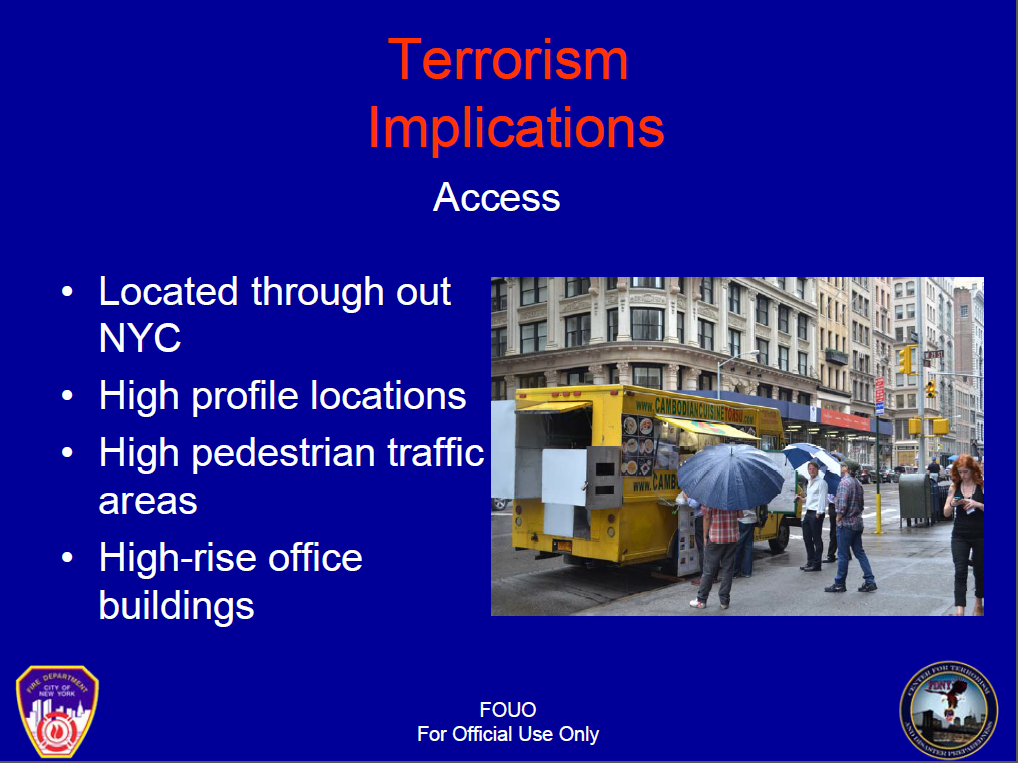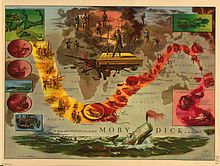If you were thought that the New York City Fire Department only put out fires and rescued stranded kitties from trees, you’d be very wrong. They have now been enlisted by the Department of Homeland Security to help fight that nebulous war on terror. The web site Tech Dirt has the sadly amusing details of the FDNY’s power point program to find a terrorist threat in food trucks that are scattered throughout NYC:
from the basically-any-form-of-transportation-is-a-threat—-start-walking,-citizen dept
It’s interesting (or maybe just kind of sad) that various government agencies see possible terrorists everywhere but rarely, if ever, catch one. Despite the large number of personnel being thrown at the problem (along with lots of money), actual terrorists seem to be in limited supply.
But these agencies haven’t let their lack of success temper their vision of a nation under constant imminent attack. Public Intelligence recently posted a Powerpoint presentation from the NYC fire department (FDNY) discussing the unique safety issues mobile food trucks present. Along with some actual concerns (many food trucks use propane and/or gasoline-powered generators to cook; some gasp aren’t properly licensed food vendors), the presenter decided to toss in some DHS speculation on yet another way terrorists might be killing us in the near future.
That’s right. Instead of serving up a quick hot meal, these food trucks will be serving up death, and lots of it! Under the heading “Terrorist Implications,” the FDNY lists the exact reasons we should be concerned, most of which begin with the word “high.”
While any terrorist organization worth its twisted ideology would do well to nail down as much of this list as possible, so would any vendor who wished to stay in business.
Seriously folks, according to our crazies in Congress lead by the fear monger in chief, Rep. Peter King (R-NY), because we haven’t been attacked means we’re due for one. That’s like trying to predict an earthquake, you can’t and attempts by using fusion centers has been complete failure that produced no useful intelligence and violated civil liberties. But that doesn’t stop them.
The Tech Dirt article goes on pointing out more bizarreness of the FDNY presentation:
The next slide continues to lay out the “Terrorism Implications,” this time reminding first responders that food trucks have large quantities of deadly liquids (propane, gasoline) and are “easily concealed” (which I assume refers to the potential explosives, rather than the truck itself… but you can never be TOO sure). Also, food bombers will usually be in the proximity of “crowds” (gasp!) and “sidewalks” (wha…?).
The DHS’ unfocused “terrorvision” continues to see a threat in every situation and the department seems to be busying itself crafting a response to every conceivable “threat.” The problem with this “method” is that it turns any slight variation of “everyday activity” into something suspicious. The number of “terrorist implications” grows exponentially while the number of solutions remains the same. This Powerpoint is another example of good, old-fashioned fear mongering, utilizing public servants to spread the message.
At no point does this presentation offer anything resembling preemptive action or deterrents. All it does is paint a picture of food trucks as potential threats before concluding with, of all things, common sense safety tips aimed at dealing with food truck fires. The final slide paints the picture in the clearest terms, letting the viewer know exactly whose agenda is being pushed:
Prepared by {..}
FDNY Center for Terrorism and Disaster PreparednessThe priorities are all screwed up. Terrorism is the first concern. Everything else is secondary. Considering this is an FDNY presentation, you’d think that “Disaster Preparedness” would be the priority. After all, they are the first response. But instead that honor goes to the vague menace of terrorism, a constant battle with no winners and, for the most part, no combatants. Every day without a terrorist act is a “win” that perpetuates the “need” for more counter-terrorist “efforts.”
Even the logo is over the top;

Here is the entire “side show”:
I suppose FDNY got a lot of money to do this.




Recent Comments